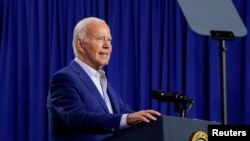U.S. President Joe Biden’s performance at Thursday’s debate — described as uneven, halting and disjointed — has left even his most ardent supporters concerned and raised the question of replacing him as the Democratic party’s candidate for president.
While many Democratic lawmakers have rallied behind the president, saying one poor performance does not mean the end of a candidacy, it is still technically possible to replace the president as the Democratic nominee. But several things would have to happen to make it a smooth transition.
Even then, for the party, finding a new candidate would be an awkward process at best.
First, Biden would need to willingly step aside. He has not shown immediate signs of doing that, telling supporters in Atlanta shortly after the debate he thought he did well and explained his performance by saying, “It’s hard to debate a liar.”
Earlier this year, each U.S. state held its presidential primary. Under Democratic Party rules, in the modern primary system, the delegates won by Biden are obligated to support him.
If Biden were to choose to step aside, however, those delegates would be free to vote for whomever they like at the Democratic National Convention, scheduled for August 19 in Chicago, making it an open convention.
Here is where the process could become awkward. Before the state primary system was adopted, conventions were open, with delegates arriving at conventions largely uncommitted. They would meet with delegations representing various candidates and negotiate and make deals.
This is the convention the Democrats would face in August, with multiple candidates vying for those delegates and multiple ballots to choose a candidate. This would likely lead to an extended convention, going on for additional days.
That would create a time crunch for Democrats to get their new candidate the ballot in all 50 states.
The Democratic National Committee this year agreed to hold a virtual roll call to nominate Biden ahead of the convention because of an Ohio law that requires a nominee to be selected by August 7 — two weeks before this year’s Democratic convention — to qualify to appear on the ballot in that state.
A proposal to relax the Ohio deadline to accommodate the Democrats was rejected by the legislature’s Republican majority.






